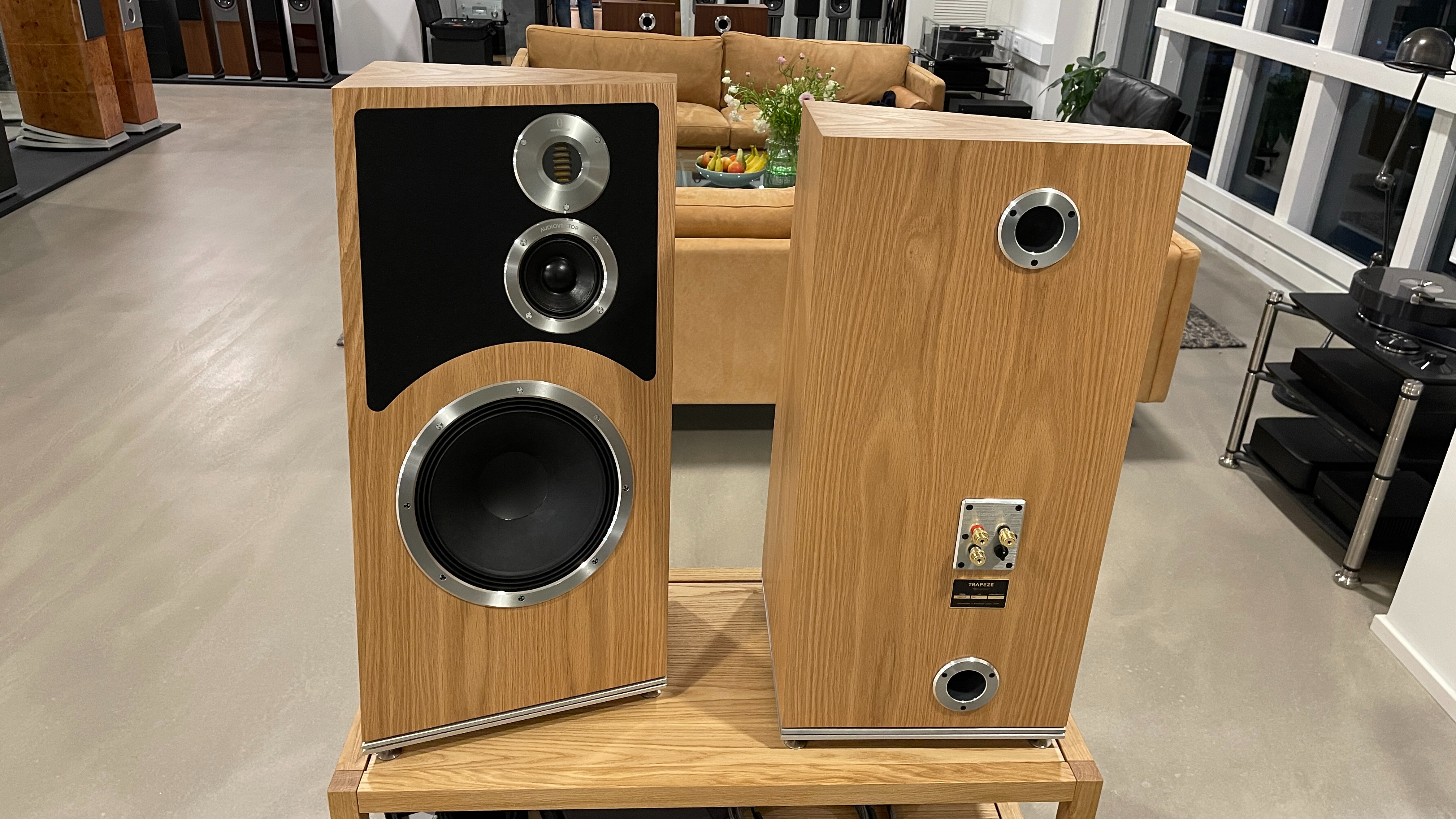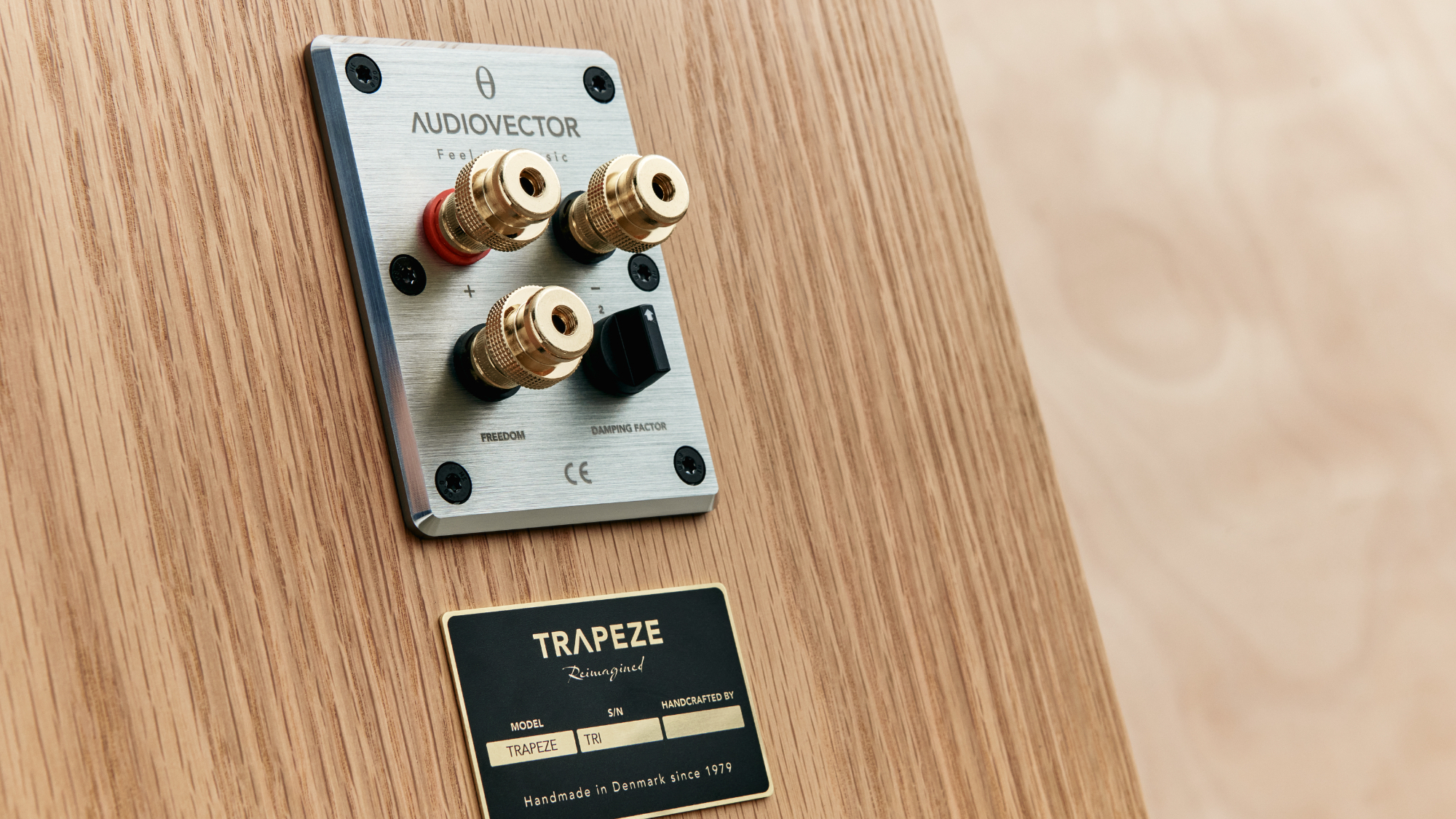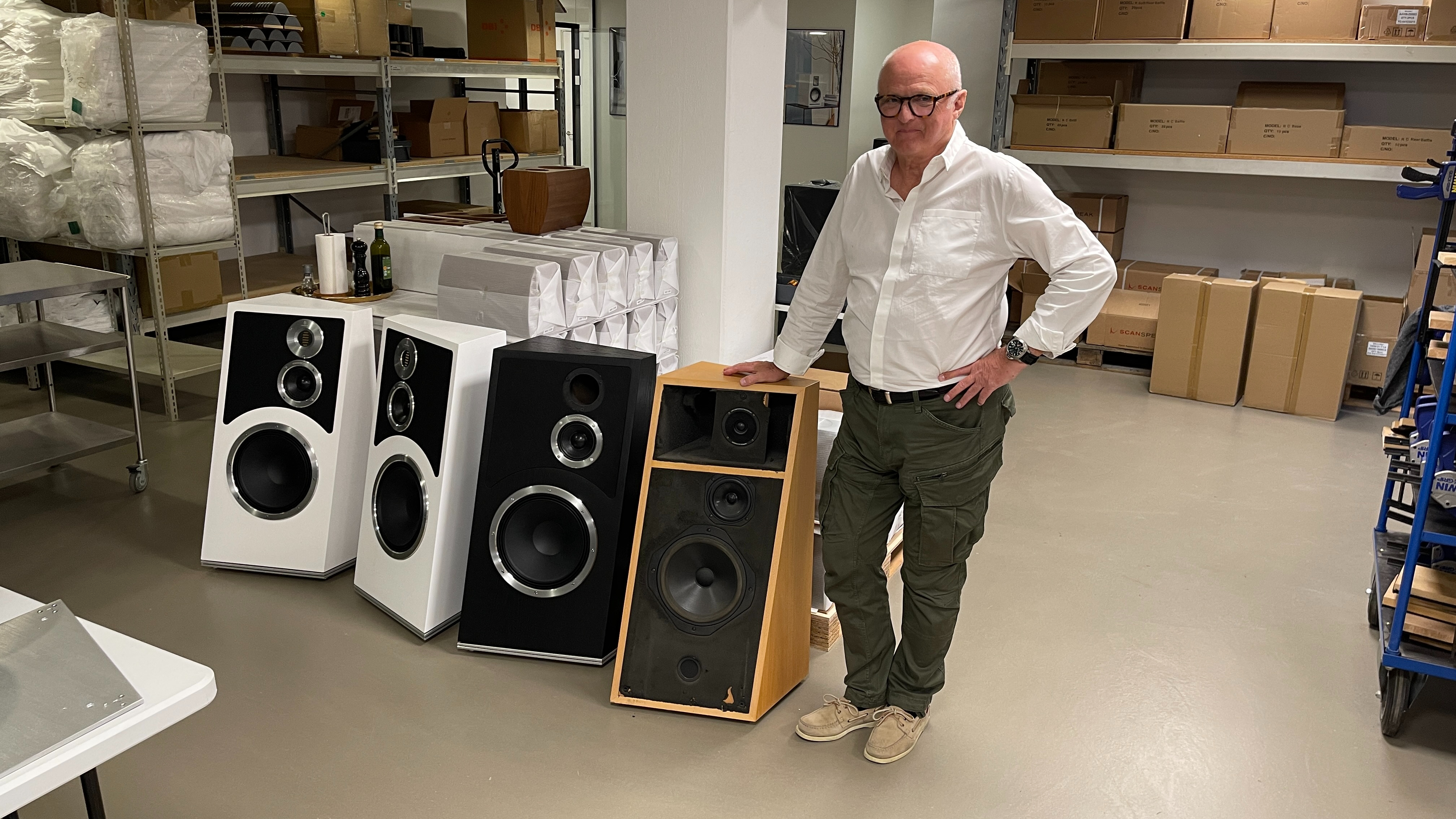
Audiovector's Trapeze Reimagined stereo speakers have been 45 years in the making. They take their name and inspiration from the company's first commercially successful model from 1979 but are a thoroughly modern design at heart.
We had a first look and listen to these new floorstanding speakers at a recent press launch event in the brand's home base in Copenhagen, Denmark, where we got to spend a good amount of time getting to know the new speakers.
These are squat speakers that are shorter (87.5cm), wider (43.5cm ) and shallower (42cm) than most modern rivals. Their angled appearance looks odd initially but their shape makes them feel less obtrusive in a domestic setting than most alternatives. They can be placed relatively close to a wall too, Audiovector recommends around 70 cm out as a good starting point. In use, the speakers seem unfussy enough to be placed a little closer if you want to.

Those angular cabinets are made of high-density fibreboard and are available in four standard finishes: Black Ash, Nordic Oak, Italian Walnut and White Silk. You can also get them painted in a wide range of custom colours if you absolutely need to match the speakers exactly to your decor. Build and finish on the early samples we have seen are up to the standards expected at this floorstander's level. The price? We're talking high-end price tags here, with the speakers costing around £15,500, $19,000 and AU$28,600 when they're available from this month.
Build & design

These are a three-way design with an AMT (Air Motion Transformer) tweeter, 13cm paper cone midrange and a combination of a forward-facing 30cm paper bass driver with an internal 20cm unit working in an isobaric configuration.
All four drivers are newly developed units and linked together with a relatively simple but high-quality crossover. The top half of the Trapeze's front baffle is covered with acoustic foam. This adds some visual interest to the speaker’s design and reduces diffraction effects caused by the enclosure’s edges.
Audiovector has long favoured AMT tweeters to cover the high frequencies citing lower mass and distortion than conventional dome designs. Such a tweeter is claimed to have good dispersion characteristics too.

The question of what to do with a tweeter's reward output has long occupied loudspeaker designers; Bower & Wilkins absorbs that sound with a damped tapered tube while KEF uses its Metamaterial Absorption Technology (MAT) to do the same job. Audiovector has taken a different route by allowing that sound to escape into the room. Look around the back of the Trapaze’s angled cabinet and you will find what looks like two ports. The one at the top is the outlet for the AMT tweeter’s rearward sound, and the lower one is the reflex port for the internal 20cm compound bass driver.
The Trapeze Ri (the shortened version of Reimagined, says Audiovector) uses treated paper cones for the midrange and dual bass drivers. The big news here is the use of corrugated surrounds on the two front baffle-mounted units. This type of surround is claimed to improve speed and dynamics.

You also find a single pair of input terminals – Audiovector has decided against offering bi-wire capability on the grounds of keeping things simple – and a connection for grounding. This should be connected to the Earth terminal on the mains via a dedicated cable that Audiovector sells. The cable isn’t cheap at £625/$770/AU$1150 for a 5m set.

You will also find a rotary dial with three settings on the terminal plate. This provides a degree of adjustment to match the speaker to your amplifier’s damping factor. Don’t worry, this isn’t a make-or-break setting. While there are general recommendations for valve and transistor amplifiers it is perfectly fine, and actively encouraged, to try the other options to see if they suit your system and taste better.
The new Trapeze have a claimed sensitivity of 88dB/W/m and a nominal impedance of 8 ohms (with a minimum of 6.5 ohms at 20kHz). That kind of electrical load shouldn’t be an issue for any good quality price comparable amplifier.
Sound

We are in unfamiliar surroundings and listening to systems we don’t know well, so it is hard to make a definite judgement on how well the Trapeze Reimagined speakers perform. We can give you our first impressions though, and they are positive.
While the inspiration for these speakers comes from a 45-year-old design, nothing about the performance feels anything less than cutting-edge at this level. We listen to the speakers with Naim’s ND555/555 PS DR music streamer and the Gryphon Audio 333 integrated amplifier and there is much to like.
For starters, the sound appears impressively clean and precise. The speakers manage to resolve plenty of detail and organise it cohesively. They sound fast and punchy when we listen to Ghostrider’s Make Us Stronger; the song’s deep bass notes being delivered with generous doses of punch and power. That compound bass loading system seems to help them dig impressively deep while still maintaining a pleasing level of grip and agility.

We are listening at high volume levels yet the Trapeze Ri never become hard or edgy. There is an impressive level of refinement here, and the ability to deliver high-frequency attack with composure. The link to the past may lead you to expect some of the overt warmth and slight softness many older products exhibit, but there is none of that here. These floorstanding speakers are even-handed and hard-hitting, exhibiting a terrific amount of agility.
We try Audiovector’s Freedom Grounding option and find it makes a notable improvement to the sound. We notice increases in dynamic expression, clarity and refinement. The presentation's background seems quieter too. In a suitably revealing system, this is something worth doing, even though the price of the dedicated cable is hefty.
Next up, we play with the adjustable damping factor adjustment and find the results more open to taste. Switching between the three settings changes the character of the speakers slightly, making them sound a little more rounded and richer or more direct and punchy, depending on the setting chosen. The optimum choice depends on your partnering amplifier and your taste, so there is no definitively correct setting as such.
Early verdict
Any definitive judgement on the performance of the Audiovector Trapeze Reimagined speakers will have to wait for the full review in our dedicated listening rooms, but we can say we are impressed with what we’ve heard so far. These speakers seem to be an unusual blend of four parts high-end and one part PA system.
They can do sophistication but give them a piece of dance music and they will do a fine impression of being the ultimate party animal. If that impression holds on longer acquaintance then it makes them something to cherish in the world of high-end.
MORE:
Our pick of the best stereo speakers







